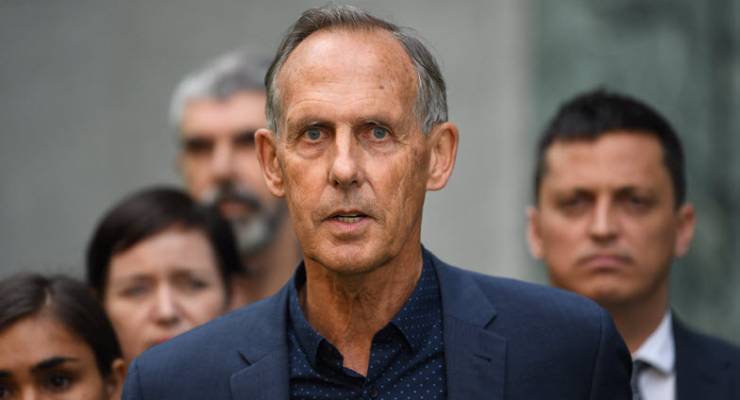
Former Australian Greens leader Bob Brown (along with forestry activist Jessica Hoyt) has brought what’s being called a “landmark case” before the High Court, challenging Tasmania’s “anti-protest laws” as being unconstitutionally restrictive towards free speech. Brown was arrested and charged under the laws at an anti-forestry protest in January 2016 . Obviously, his argument is nonsense — our media and our politicians and our parliamentary committees (and our media again and our politicians again) keep a rigorous eye on issues around free speech, and they’ve said nary a word about protest laws in Australia. Let’s check in on a few states and satisfy ourselves that while free speech is definitely under threat — from PC culture, Islam, 18C, Gillian Triggs in particular, the left, identity politics — this issue is just Bob Brown, as ever, having a total whinge. These are the three states in Australia where protesting could come with a jail sentence.
Tasmania
A pedant might say the law in Tasmania is aimed at stifling protest, given it covers any acts that are “in furtherance of, or for the purposes of promoting awareness of or support for an opinion, or belief, in respect of a political, environmental, social, cultural or economic issue” and is called Workplaces (protection from protesters) Act. But it’s just aimed at making sure hardworking Tassies can make a living without being impeded and threatened by greenie extremists. Which is why it applies to public and private land. Wait, what?
Protesters who do not leave a “business access area” when directed by police face penalties of up to $10,000 each . Causing or threatening damage or risk to the safety of a business could result in a fine of up to $250,000 for a body corporate and a $50,000 fine or five years’ imprisonment for an individual. When the bill was before the Tasmanian upper house, United Nations special rapporteur on freedom of opinion and expression David Kaye urged Tasmania to refrain from implementing the measures, saying:
“The law itself and the penalties imposed are disproportionate and unnecessary in balancing the rights to free expression and peaceful assembly and the government’s interests in preserving economic or business interests. The bill would have the chilling effect of silencing dissenters and outlawing speech protected by international human rights law.”
New South Wales
Commencing in June last year, New South Wales law allows police to move on protesters if they deem it necessary to avoid a safety risk, increased the previous fines for trespass 10-fold and expanded what the word “mine” means for the offence of “interfering with a mine”.
The new definition of “mine” includes all “extraction, exploration, construction and decommissioning sites for petroleum, gas and minerals”. The new offences include “intentionally or recklessly hindering the working of the equipment of a mine”. It also makes it possible for a police officer, without a warrant, to seize anything the officer “suspects” might be used to secure a protester to any “plant, equipment or structure for the purpose of interfering with the conduct of a business or undertaking”.
The legislation, coincidentally, apprehends some of the conduct that helped bring about about Barry Farrell’s freeze on coal seam gas exploration in NSW back in 2014. We’re not saying that the NSW chased after public expressions of political conviction by a certain group because it was inconvenient to business interests because … well, because that would be grotesque and someone would have said something, wouldn’t they?
Western Australia
People might say that the vague and sweeping wording (that made an offence of possessing “things that aid in the prevention of lawful activity”) and reversed onus of proof in the proposed WA legislation (which would require a protester who had been charged based on suspicion of intending to commit an offence to prove that they weren’t intending to trespass or commit a crime) as a complete Orwellian nightmare. The argument of course is if you don’t want to be arrested for being suspicious, don’t go to a protest. But this airtight logic didn’t stop the Law Society of Western Australia and, oh look, the UN again from criticising it. New Premier Mark McGowan promised before the election to repeal the laws if elected. The bill had not been passed by the time of the election, but the new government has made no concrete announcement beyond their election promise.








Well, Charles, I hope Bob Brown wins, and that all the other black uniformed enforcers our Governments seem to want to inflict on us while religiously mouthing “security” get their budgets screwed, and their right to inflict their orthodoxies on us removed. Ms Triggs at least identified that free speech no longer is, in our country. And yes, we need a Bill of Rights
Well, Charles, I hope Bob Brown wins, and that all the other black uniformed enforcers our Governments seem to want to inflict on us while religiously mouthing “security” get their budgets screwed, and their right to inflict their orthodoxies on us removed. Ms Triggs at least identified that free speech no longer is, in our country. And yes, we need a Bill of Rights soon.
Any dispute between a mug punter with more muscle than brain tissue and a principle is a lost cause – see the Qld gov’s million trillion jobs promised by Adani.
As with the Franklin, the only hope is the High Court and we can be sure that this highly intelligent, ethically sound & not at all subject to bigbuck$ federal regime will not oppose any such case brought in the public interest.
Oh, look, Porcus Aviatrix!